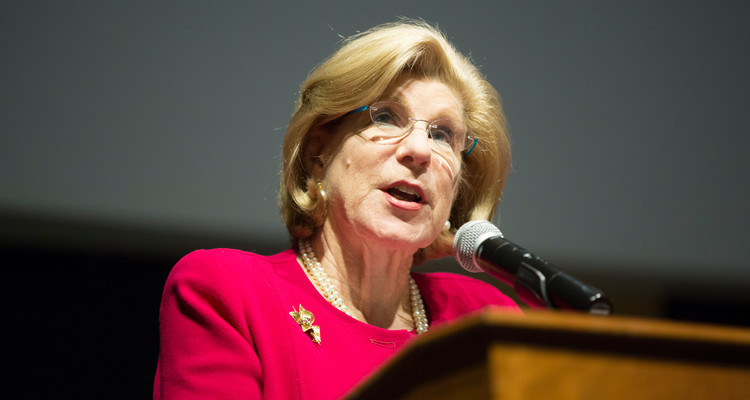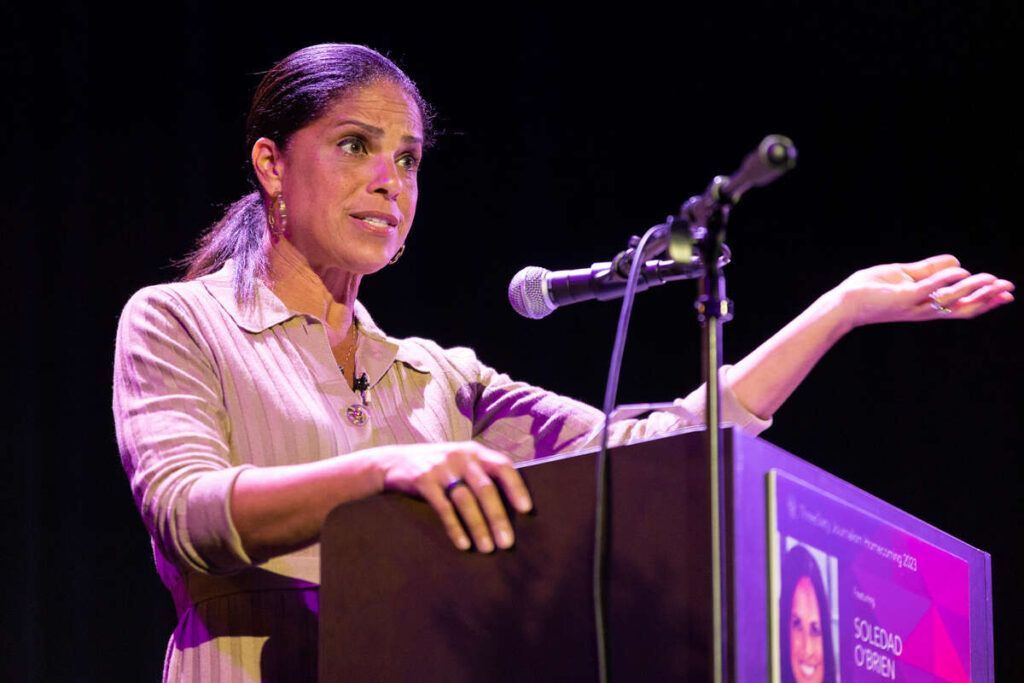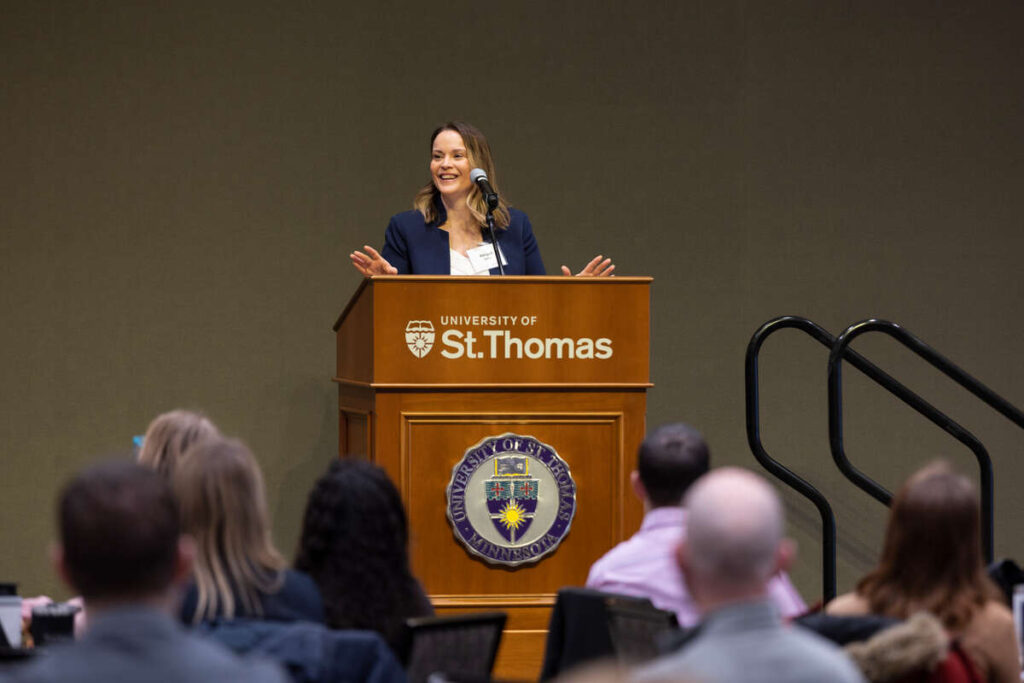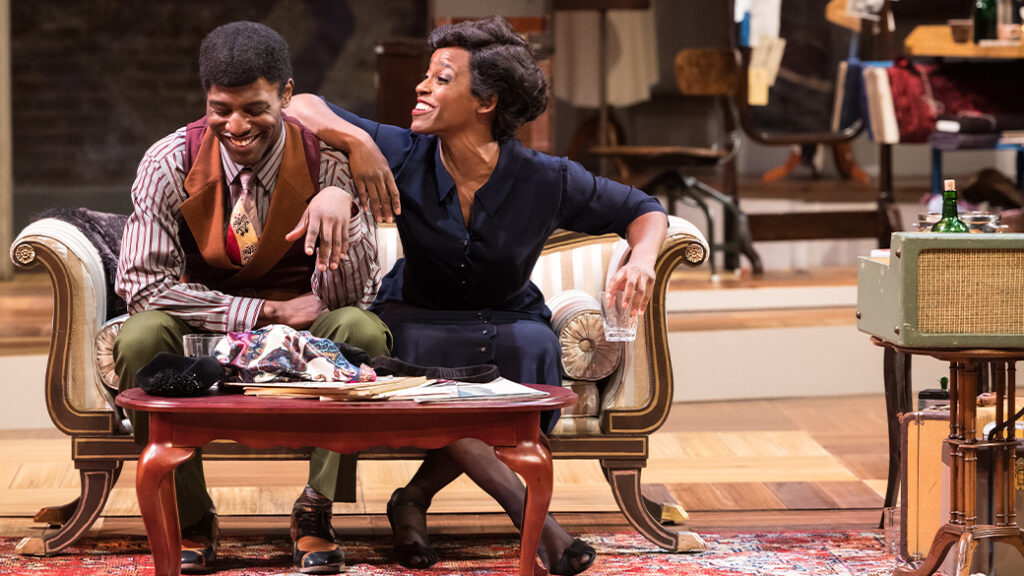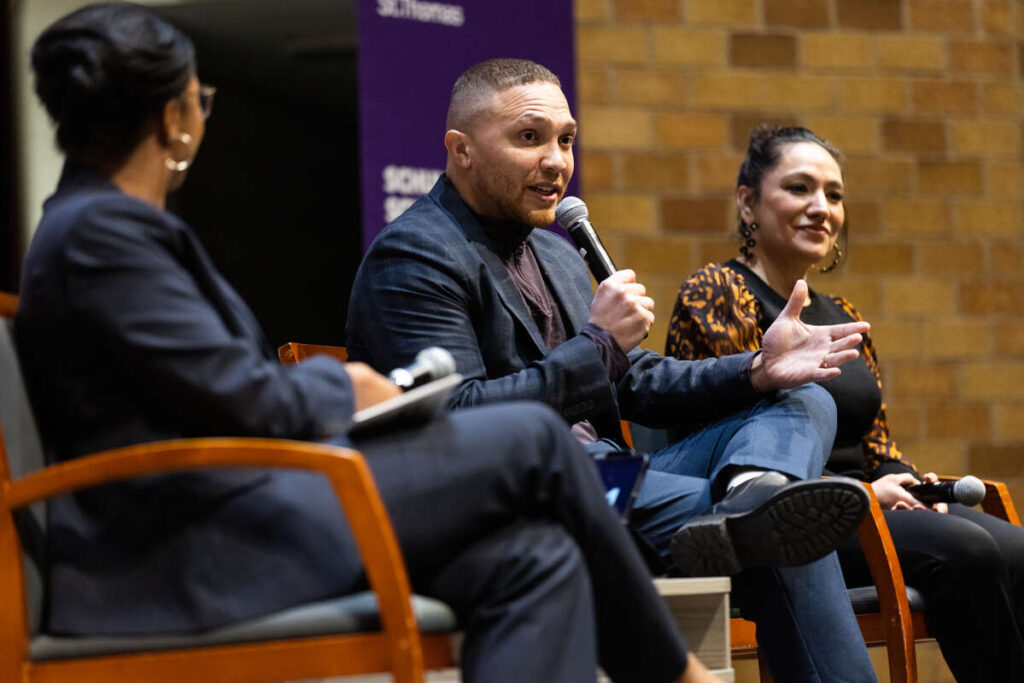Award-winning National Public Radio legal affairs correspondent Nina Totenberg spoke to a full crowd in O'Shaughnessy Educational Center auditorium as this year's Women History Month speaker. The event was sponsored by the Luann Dummer Center for Women.
Totenberg joined NPR in 1975 and has made a career out of revealing the inner workings of the Supreme Court. She has broken a number of momentous stories, including former President Richard Nixon's secret list of Supreme Court candidates, Supreme Court Chief Justice nominee William Rehnquist’s opposition to the Equal Rights Amendment and Anita Hill’s sexual harassment allegations against then Supreme Court Justice nominee Clarence Thomas. Totenberg’s reports air regularly on NPR’s critically acclaimed programs “All Things Considered,” “Morning Edition” and “Weekend Edition.”
Totenberg proved why she is recognized as a master storyteller, weaving humor, history and personal anecdotes. She focused on Sandra Day O'Connor's and Ruth Bader Ginsburg's roles as the first women on the Supreme Court and then discussed President Donald Trump's nominee, Neil Gorsuch, and how he fits into the history and hopes of conservatives.
Here are five observations from her talk.
Judges are people too
Totenberg kicked off her talk by reminding the audience that Supreme Court justices "are very smart folks, but they're still people, with all the foibles and virtues that real people have." She shared several bench notes that Henry Blackmun had saved from his tenure, including one from O'Connor commenting on his hearing aid and one that he received during the Nixon scandal, which shared that former Vice President Spiro Agnew had resigned – and also the score of a Mets vs. Reds game.
Her relationships with several of the justices, and particularly friendships with Antonin Scalia and Ginsburg, highlighted both the realness of the justices and the longevity of Totenberg's career. (During the Q&A, she even wondered, and slightly theorized, over what Scalia would have thought of Trump.) She spoke a few times of personal interactions, reminding the audience that these relationships were necessary to her career. "You don't find things out by staying above the fray," she said.
O'Connor and Ginsburg are women to be admired
Totenberg outlined both O'Connor's and Ginsburg's backgrounds as the first two women to be appointed to the Supreme Court, touching on their struggles to find employment and Ginsburg's hiding her second pregnancy so it wouldn't hurt her career. "Both women traversed quite a journey before reaching their exalted status. They began their careers at a time when women, simply because they were women, could legally be denied jobs, mortgages ... even the right to serve on a jury," Totenberg said.
She pointed out that although O'Connor and Ginsburg had different backgrounds and different approaches to judging, they appreciated having an ally on women's rights as well someone who understood the experience of being a woman. She added that in the three years Ginsburg was the only female on the Supreme Court, she missed having another woman.
Conservatives care deeply about the Supreme Court and are frustrated with how some recent cases have turned out for them
Totenberg focused on how and why recent judges have been nominated and picked for the Supreme Court. She paid particular attention to President Barack Obama's attempt to appoint Merrick Garland to the Supreme Court while Republicans controlled the Senate, and also discussed Gorsuch's background. She believes it is likely that Gorsuch's appointment will go through.
She added that throughout the 20th century, conservatives who have been replaced on the court always have been replaced by someone who leans even further right, citing the example of former Justice Paul Stevens, who was considered a moderate when elected and was seen as liberal by the end.
"Conservatives are very clear about what they want on the court. Democrats and liberals care, but they don't with the same fervor. They haven't been deprived as long as conservatives," Totenberg said. "Even though the court has gotten more and more and more conservative, it hasn't yielded on a couple of a issues conservatives care most about: abortion, same-sex marriage or gay rights ... and religious rights."
It is hard to predict what is going to happen
Totenberg earned a few laughs when she said she is "loathe to make political predictions" in the current environment and more seriously discussed the difficulties of predicting what will play out in the Supreme Court over the next few years. She said that retirement, illness and death are always an uncertainty on the Supreme Court and reminded audience members that three justices are over 70: Ginsburg will be 84 this month, Stephen Breyer is 78 and Anthony Kennedy, sometimes known as being a swing vote in the court, is 80.
While sticking to not making predictions, she acknowledged that it's possible Kennedy might retire and that some have seen Trump's nomination of Gorsuch as a nod to Kennedy that it is safe to do so. Totenberg said that even one slot would move the court "dramatically" to the right and three would allow the conservatives to dominate. With such a change in the composition of the court, Totenberg said we could expect to see increased hostility to environmental rights, voting rights, civil rights and unions, and that Roe v. Wade might be overturned.
Be an educated citizen
During the Q&A, Totenberg was asked if she thought it was true the courts and press would be able to "save us." Totenberg responded, "You have to save yourself," and to do that she said each person should be an educated citizen. She emphasized reading things that you don't agree with, particularly if they're well reasoned and well written.
"Being in an echo chamber is bad for democracy and boring," said Totenberg, adding that it doesn't help people to grow how they think.
She added that it is her job, as a reporter, to inform people and to tell great stories.
"I wanted to be a witness and to tell people great stories and do it with a narrative and vividness that they would remember," Totenberg said as she finished up the Q&A.
